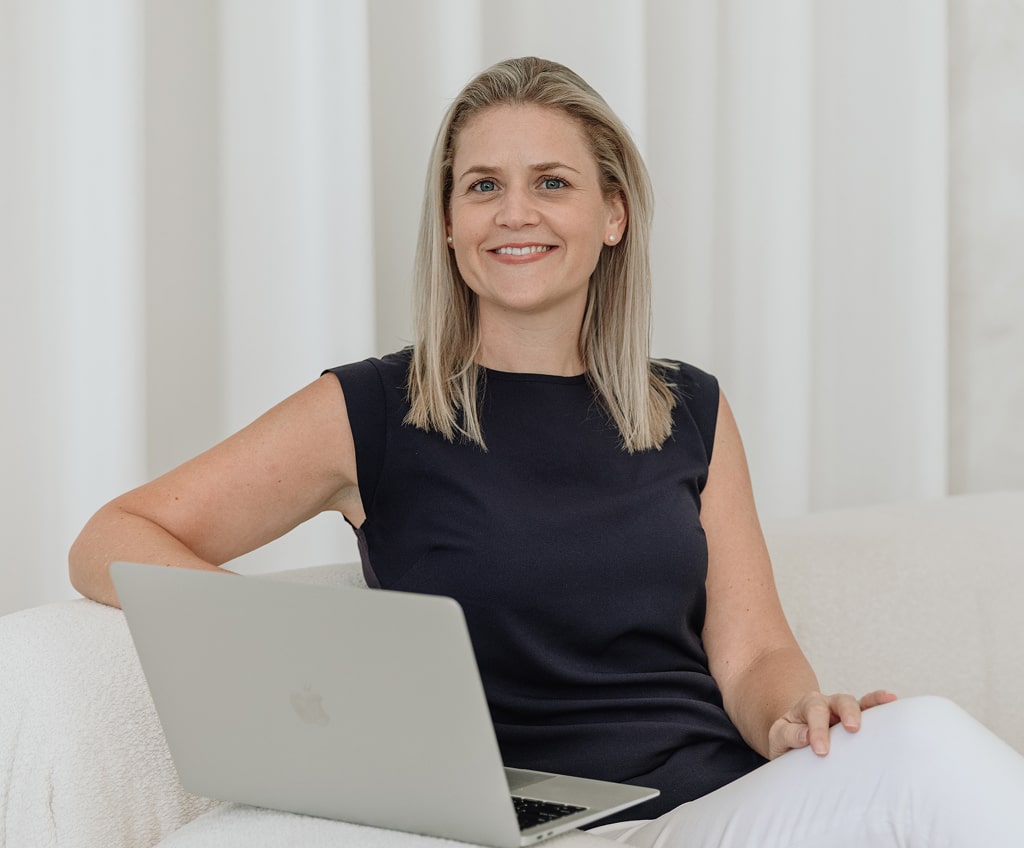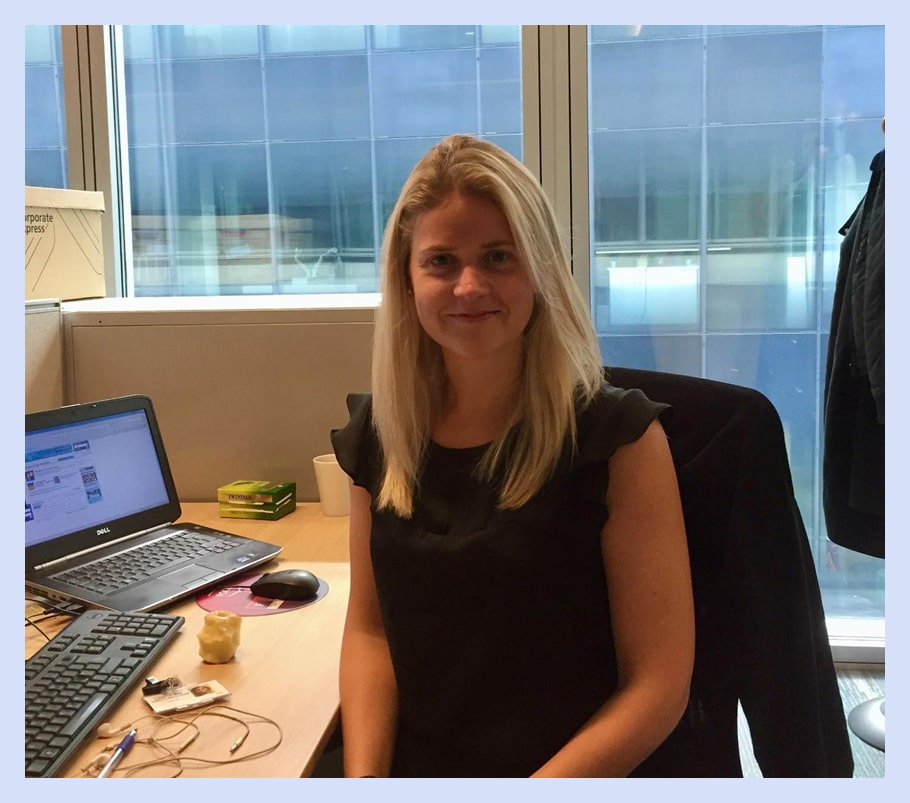From Banking to Coaching: Real-World Advice for Building a Purposeful Career
by Skills U
Updated on September 30, 2025
Copy link
Share on LinkedIn

This feature spotlights Caroline W., an ICF-Accredited Career Coach with extensive experience in guiding individuals through career transitions. Caroline shares her background, insights on today’s job market challenges, and practical advice for upskilling and career advancement. Drawing from her own shift from banking to coaching, she offers valuable perspectives that resonate with students, career switchers, and professionals alike.
Caroline’s Career Journey
To kick things off, Caroline shared a brief overview of her career journey.
Q: Can you give us a quick snapshot of who you are and your career path?
I’m Caroline, an ICF Accredited Career Coach. I actually started my career in banking and am a qualified accountant. Having gone through my own career change, I know firsthand how challenging such transitions can be.
Q: What was your early career like?
I began on a graduate programme in audit, training to become a qualified accountant. Over 12 years, I worked for three global banks, developing strong leadership, stakeholder management, and team-building skills.

I truly enjoyed my years in financial services – working with great people and learning how businesses operate – but I eventually realised it wasn’t the right career for me. Although I was relatively successful, the work didn’t align with my personal values or give me the sense of purpose and energy I was looking for. I felt a lack of fulfillment.
Q: What inspired your move into coaching?
Throughout my time in banking, I had the opportunity to lead teams, conduct interviews, provide coaching, and guidecolleagues through end-of-year reviews. These were the parts of my job I absolutely loved.
Those experiences sparked the realisation that my true passion lay in helping people with their careers. I began learning more about career coaching, and the more I discovered, the more excited I became about pursuing it full time.
Q: How did you transition into career coaching?
Pursuing professional coaching qualifications felt like a natural next step. The training reaffirmed that I was on the right path – it genuinely felt like I had found my purpose.
I officially transitioned into career coaching in 2015. Fast forward to 2025, and I now have well over 1,000 hours of coaching experience, having worked with hundreds of people and multiple organisations to support their growth and career transitions.
Q: What have been the most rewarding aspects of your journey?
I genuinely love engaging with people about their careers – whether they’re thriving and fulfilled or feeling stuck and seeking change. Nothing brings me more joy than witnessing the transformation in my clients when they land a job they’re excited about, or when they discover what they truly want to do and start moving toward it.
I feel incredibly grateful to have found a career that truly fulfills me. Helping people with their career journeys and seeing their gratitude for this support is deeply rewarding. It gives me so much energy knowing that I get to play a small part as they navigate one of the most important areas of their lives.
I believe that everyone deserves to love what they do, and my mission is to support as many people as possible in creating careers that bring them joy and purpose.
Client Story:
When I first met Lisa, she was a Business Development Manager in a large, male-dominated corporate environment. She felt stuck and unsure about her next step, but she knew she wasn’t happy where she was.
Over the next few months, we explored what mattered most to her – her values, interests, and the kind of work that felt meaningful. She brainstormed ideas, researched different paths, and even volunteered to test new directions. From there, we created a clear, practical action plan to bring her ideas to life.
Today, she’s happy and fulfilled in her career, a perfect example of how clarity, experimentation, and consistent action can lead to a fantastic outcome.
Testimonial from Lisa:
“I have just completed the Project Career Change programme with Caroline, which was fantastic! It was intense, fast-paced, and full of thought-provoking and action-oriented tasks that taught me so much about myself – the type of person I am, the careers I’m suited to, and ultimately, what my dream career is. Caroline is a wonderful person; throughout the entire course, she was supportive, honest, proactive, encouraging, and completely dedicated to helping me. The design and pace of her course kept me motivated, accountable, and focused throughout. Having her truly believe in me and my new chosen career has been invaluable – I now believe in myself and am well on my way to success. Thank you, Caroline! I loved it and already miss it!
I encourage anyone who feels stuck in their career to invest in themselves and let Caroline guide them on their exciting new journey – you’ll love it too! Happy career changing.”
Philosophy for Guiding Clients
Q: What’s your coaching philosophy when working with clients?
My coaching approach is highly personalised – because everyone’s career journey is unique. I focus on helping people understand who they are, what matters most to them, and how to create a career that aligns with their strengths, values, and long-term goals.
It’s not just about finding the next job. It’s about building a sustainable and fulfilling career path that truly fits who they are.
Q: How do you guide clients to develop a clear career path?
My approach involves a three-stage process: Self-Assessment, Research and Career Planning.
- 1. Self-Assessment
- Strengths and skills inventory: I help clients reflect on their past experiences, both professional and personal, to identify patterns of success and areas where they excel. Tools like Strengths Profile, DISC and feedback can provide valuable insights.
- Values and motivations: Understanding what drives them as this helps to identify roles and industries where they'll thrive.
- Interests and passions: I encourage clients to consider what they enjoy doing and what gives them energy.
- 2. Research
- Industry research: I use various research and AI tools to explore industries and roles that align with my clients’ strengths and interests.
- Informational interviews: I recommend having conversations with professionals in fields they're interested in to gain real-world insights.
- Skills mapping: Next would be to identify gaps between their current skills and the skills needed in their target roles, and then creating a plan to bridge those gaps.
- 3. Career Planning
- Short- and long-term goals: Setting SMART (Specific, Measurable, Achievable, Relevant, Time-bound) goals helps clients focus on smaller, actionable steps.
- Career vision: I guide them in crafting a vision statement for their career, which serves as a compass helping them with where they want to go.
- Resume and LinkedIn optimisation: Together, we create a strong narrative that showcases their skills, achievements, and aspirations.
- Accountability: Regular check-ins ensure progress and allow for adjustments to the plan along the way.
- Celebrating wins: Acknowledging and celebrating milestones keeps motivation high and builds confidence.
Testimonial from Bill:
“I first engaged with Caroline in October 2024, a matter of 2 weeks before finishing with a company I had worked at for 31 years, at that point, it was 17 years since I interviewed for a job outside that company. To say the prospect of getting back onto the job market and going through the process of finding a new role was daunting is a gross understatement. Turning 55, perceived as institutionalised, who would hire me is where my thoughts were at the time.
From the start, Caroline was positive and encouraging, providing direct and straight input and guidance. She made a potentially stressful process of updating CV and LinkedIn profile feel effortless, engaged in a couple of reviews with excellent feedback and encouragement given. In no small part due to the guidance from Caroline, I had a solid CV and LinkedIn profile, 7 job applications and 3 interviews within 8 weeks. Within a further 4 weeks, I had secured 2 offers.
I had 2 meetings with Caroline after starting in my new role where she helped me through defining clear goals and strategies for the first few months, another invaluable contribution!”

Insights for Organisations: Building Inclusive and Future-Ready Workforces
In addition to her work with individuals, Caroline has also supported organisations and HR teams in developing inclusive, forward-thinking talent strategies. She shared her insights on how institutions can foster career growth for diverse learners, prepare employees for the skills of the future, and lead lasting organisational change.
Fostering Career Advancement for Diverse Learners
Supporting diverse learners isn’t just the right thing to do – it helps businesses attract, grow, and retain exceptional talent.
Ways to support inclusion and career growth:
- Understand who’s engaging. Analyse who’s participating in learning and who isn’t. Use data and feedback to identify gaps and areas that need more focus.
- Offer flexibility. Provide different learning formats – online (video, audio), in-person, or blended – to suit varying learning styles and schedules.
- Make progression clear. Be transparent about what good performance looks like and what’s required to progress. Every employee should have a clear career growth plan.
- Create formal mentoring and coaching opportunities. Match people across teams, levels, and backgrounds to promote shared learning and new perspectives.
- Train managers in inclusion. Equip leaders with the tools and awareness to support every team member’s development fairly.
Best practices from diverse client work:
- Local ownership works best. Empower regional teams to shape programmes that reflect cultural and practical realities.
- One size doesn’t fit all. Adapt content, language, and delivery styles to reflect local working and learning cultures.
- Celebrate differences. Highlight success stories and case studies from employees with varied backgrounds so that everyone can see what’s possible.
Emerging Skills for Future Career Success
The world of work is evolving rapidly due to new technologies, shifting priorities, and rising expectations.
The skills that matter most:
- Digital confidence and AI literacy. Everyone should understand how AI fits into their role and how to use digital tools effectively.
- Human skills. As automation handles routine work, empathy, communication, and emotional intelligence are becoming even more valuable.
- Critical thinking. With information everywhere – not all of it accurate – the ability to question, analyse, and make sound judgements is crucial.
- Adaptability and lifelong learning. The capacity to pivot, learn quickly, and stay curious defines career success in fast-changing environments.
- Sustainability and ethics. Awareness of environmental and social impact is now essential, not optional.
How educators and organisations can help:
- Make learning real. Combine theory with practical projects and cross-functional collaboration. Application reinforces understanding.
- Raise awareness. Encourage self-reflection so learners can identify skills gaps and take ownership of their growth.
- Encourage experimentation. Give people the freedom to test new tools and ideas in a safe environment.
- Inclusive leadership. Promote diverse perspectives and collaboration across teams and cultures.
- Create a learning culture. Ensure learning is embedded into everyday work, not limited to occasional training sessions.
Advice for HR Leaders Driving Lasting Organisational Change
Sustainable organisational change grows from consistency, communication, and trust. HR plays a pivotal role in turning strategy into everyday behaviour.
Guiding teams through change:
- Start with people. Understand how change affects individuals before building a plan.
- Communicate clearly and often. Be transparent about what’s changing and why. Small, regular updates build far more confidence than one-off announcements.
- Acknowledge emotions. Change can feel unsettling. Create space for open conversations – not just checklists and deadlines.
- Celebrate progress. Recognising small wins keeps motivation high and makes change feel achievable.
How HR can sustain workforce development:
- Link learning to strategy. Connect development programmes directly to business goals.
- Empower managers. Equip line managers to coach, listen, and support career growth.
- Make learning continuous. Replace one-off training with short, regular learning moments.
- Keep inclusion central. Ensure growth opportunities are available to everyone, not just the most visible.
- Measure impact. Track how learning translates into behavioural change and business results.
Change succeeds when people feel part of it. HR leaders who listen, involve others, and keep development visible help build resilient, future-ready organisations.

Trends Influencing the Future of Work
To look ahead, Caroline explored the key trends shaping the future of work and how jobseekers can prepare for success in a fast-evolving landscape.
Q: What trends do you see shaping the future of work, and how should people prepare for these changes?
The future of work is being shaped by several major shifts, and preparing for them means staying adaptable, continuously learning, and maintaining a proactive, growth-oriented mindset.
- The rise of AI tools: AI is rapidly transforming every industry. Learn to use the tools relevant to your field and stay curious about new developments. At the same time, continue developing the human skills that AI can’t replace – creativity, critical thinking, emotional intelligence, problem-solving, and leadership.
- Remote and Hybrid Working: Flexible work arrangements have become the norm, bringing both freedom and new challenges. Set yourself up for success by investing in a good workspace, developing strong communication habits, and intentionally building relationships in online environments.
- Portfolio Careers: More people are combining freelancing, part-time work, and side projects to create multiple income streams and greater flexibility. Strengthen your entrepreneurial mindset, build your online presence so potential clients and employers can find you, and stay open to new ways of shaping your career.
- The need to upskill: Technology evolves fast – which means continuous upskilling and reskilling are essential. Explore short courses, certifications, and workshops. Identify emerging tools and trends in your field early, so you can stay ahead of the curve.
- Sustainability and Purpose-Driven Work: An increasing number of professionals are prioritising impact and purpose over profit. I’m seeing more clients who value sustainability and social contribution as core parts of their careers. Learn about sustainability practices in your industry and look for organisations whose values align with your own.
Q: How do you advise clients to navigate the impact of automation and AI in their industries?
Keep yourself informed about how technology is shaping your profession. Follow industry leaders, attend webinars or conferences, and stay curious about what’s next.
AI is now part of most job descriptions, so understanding its relevance to your role is crucial. Take short courses, experiment with tools, and find ways to use them to streamline your work or add value.
Join online communities and professional groups to see how others in your field are using AI. Learn from their experiences, ask questions, and share your own discoveries.
Ultimately, the goal isn’t to compete with technology – it’s to use it as a tool that helps you work smarter, not harder. Stay curious, keep learning, and embrace change. That’s how you remain relevant in an ever-evolving world.
Q: Are there particular industries or skills you see as most promising for people looking to switch careers?
There are so many exciting opportunities across different sectors right now. I’d divide them into promising industries and in-demand skills.
Promising industries:
- Technology: Data analytics, software development, cybersecurity, cloud computing, AI engineering.
- Healthcare: Health tech, telemedicine, and wellness innovation.
- Green and renewable energy: ESG analysis, sustainability consulting, and environmental management.
- Education technology: Online learning, instructional design, and e-learning platforms.
- Creative industries: UX/UI design, game design, digital content creation, and media production.
In-demand skills:
- Data analysis (one of the top-searched skills on LinkedIn)
- Coding (Python, JavaScript, SQL)
- Artificial Intelligence & Machine Learning
- Cybersecurity and ethical hacking
- Cloud computing
- Project management (Agile, Scrum, PRINCE2)
- ESG and sustainability standards
- Core soft skills: emotional intelligence, creativity, collaboration, and strategic thinking
These skills are becoming universal currencies – valuable across sectors and roles. The key is to combine technical know-how with strong interpersonal and problem-solving abilities.
Q: What are the top tools or resources you recommend for reskilling, upskilling, and staying ahead in the workforce?
We are incredibly fortunate to have access to so many learning platforms and communities today.
Here are some of my go-to recommendations:
- TED Talks – Inspiring talks from experts and thought leaders.
- LinkedIn Learning – Thousands of high-quality courses across industries.
- Udemy – Affordable and diverse learning options to build practical skills.
- Udacity – Excellent for tech-focused nanodegrees and applied learning.
- Slack Communities – Great for connecting with professionals in tech, design, and startups.
- Podcasts – Perfect for on-the-go learning; you can find one for almost any career path.
- ADPList – A fantastic mentoring platform connecting professionals across fields.
- LinkedIn – Still one of the most powerful tools for networking, learning, and visibility. With over 1 billion users, it’s an incredible resource to build your professional brand.
Recommended TED Talks:
- The Best Career Path Isn’t Always a Straight Line – Sarah Ellis & Helen Tupper
- Your Body Language May Shape Who You Are – Amy Cuddy
Recommended Podcasts:
- How to Be Awesome at Your Job
- The School of Greatness
- The Diary of a CEO
Closing Thoughts
Speaking with Caroline makes it clear that success in the modern job market isn’t about having all the answers – it’s about having the mindset to keep evolving.
Whether you’re a student starting out or a professional looking to pivot, the path forward is paved with curiosity, adaptability, and courage to take the next step.
Caroline’s Final Recommendations
“Stay curious, keep learning and be open to change. That’s how you stay relevant in a world where technology keeps moving.
Consistency matters more than perfection – small, regular actions create confidence and momentum. Step by step, you’ll get closer to building the career and lifestyle you truly want.”
Looking to upskill your workforce or launch new learning initiatives? Share your details and we’ll explore solutions together.
We’ve trained professionals at some of the world’s leading companies.
Looking to upskill your workforce or launch new learning initiatives? Share your details and we’ll explore solutions together.
We’ve trained professionals at some of the world’s leading companies.


